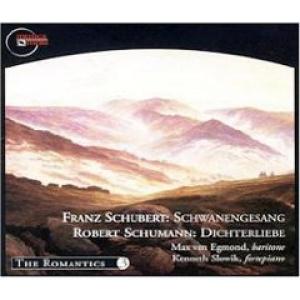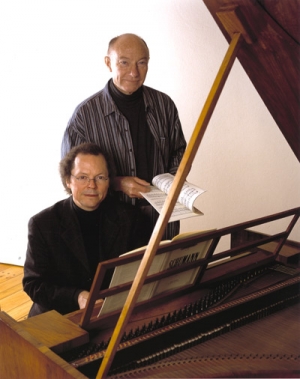- Home
- About
- About SCMS
- Directors
- Artists
- Vera Beths
- Steven Dann
- Marc Destrubé
- James Dunham
- Mark Fewer
- Eric Hoeprich
- Christopher Krueger
- Myron Lutzke
- Marilyn McDonald
- Douglas McNabney
- Mitzi Meyerson
- Pedja Muzijevic
- Anca Nicolau
- Jacques Ogg
- Loretta O'Sullivan
- Lambert Orkis
- Paolo Pandolfo
- William Purvis
- Marc Schachman
- Jaap Schröder
- Andrew Schwartz
- William Sharp
- Ian Swensen
- Lucy van Dael
- Ensembles
- Concerts
- The Collection
- Recordings
- Education
- Donate
Franz Schubert: Schwanengesang (Swan Song), D957; Robert Schumann: Dichterliebe (The Poet’s Love), Op. 48
Max van Egmond, baritone; Kenneth Slowik, fortepiano
Musica Omnia 0102

In antique myth, swans—those most beautiful of birds—sing their only song just before dying, and their last utterance is of unearthly beauty. Two of many who made use of this symbolic lore to hymn the final achievements of great artists were the Viennese publisher Tobias Haslinger and Ferdinand Schubert, Franz Schubert’s older brother, in whose cramped apartment in the house dubbed “Zur Stadt Ronsperg” Schubert died on 19 November 1828. On 17 December 1828, Ferdinand sold a manuscript containing seven songs on texts by Ludwig Rellstab and six on texts by Heinrich Heine, as well as the manuscripts of the last three piano sonatas, to Haslinger for some 500 florins; an unrelated song, “Die Taubenpost,” dated “October 1828,” was sold to the same publisher shortly thereafter. The day following the sale, on 18 December 1828, Haslinger published an announcement in the Wiener Zeitung to say that he “had purchased as his legal property Franz Schubert’s last compositions for voice and piano from the estate of the recently deceased, incomparable composer,” fourteen songs in all. On 31 January 1829, he announced in the same periodical the impending appearance of the Schwanen-Gesang: “Under the above title are offered to the numerous friends of the composer’s classic muse, the last blossoms of his noble spirit. These are the compositions he wrote in August 1828, shortly before he left this world, works which proclaim in the most definitive manner the consummate nature of his mastery.”
—from Susan Youens’ liner notes

Van Egmond and Slowik at the Smithsonian’s ca. 1830 Graf fortepiano
Lyrics to “Der Doppelgänger”
|
Der Doppelgänger Still ist die Nacht, es ruhen die Gassen, Da steht auch ein Mensch und starrt in die Höhe Du Doppelgänger, du bleicher Geselle! |
The Ghostly Double Still is the night, the streets are at rest; There too stands a man, staring up
You ghostly double, you pale companion! |
Listen to “Doppelgänger” from Schwanengesang
Max van Egmond, very ably seconded by American fortepianist Kenneth Slowik, conveys both the inner kernel of each song’s meaning, and an entirely appropriate nostalgia: the light and flexible sounds call up beautiful memories, of which nowadays you hear much too little, while his more somber moments are almost craggy in their intensity. Beautifully done.
—Tijdschrift oudemuziek (Amsterdam)
On this album:
[1]–[14] Franz Schubert: Schwanengesang, d957
[15]–[30] Robert Schumann: Dichterliebe, Op. 48


